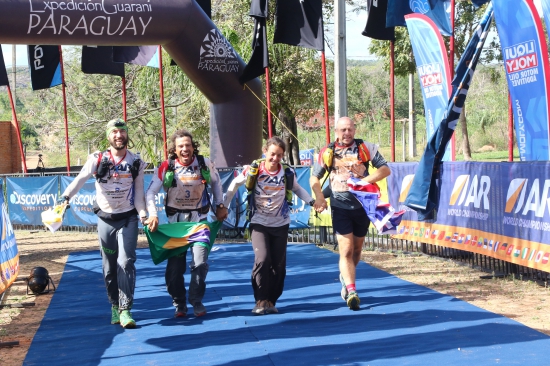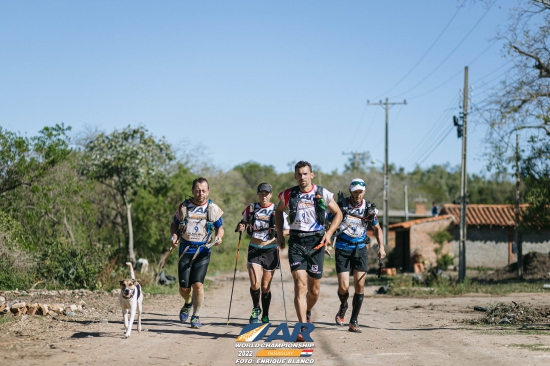ARWC 2022 - Expedición Guaraní
Experience Counts for the top 5 teams at the Adventure Racing World Championship
Press Release / 23.09.2022


The top five teams at the Adventure Racing World Championship in Paraguay come from New Zealand, Sweden, Brazil, Estonia and the Czech Republic and their placings are no surprise, given the experience of the teams. Experience is everything in expedition adventure racing. You have to earn the right to be at the top over many years of racing.
In fifth was Black Hill from the Czech Republic, and they have raced every Adventure Racing World Championship since 2014, and only once finished outside the top 10. This was their 7th ARWC. Fourth placed team Estonian ACE Adventure – La Sportiva is the current world #1 ranked team and were second at ARWC last year.
Third placed Brazil Multisport are the defending champions at Expedicion Guarani in Paraguay, and have raced here 20 times between the four of them, winning almost all 6 of the races. They are also the current ARWS South America Region champions. In second place was the Swedish Armed Forces Adventure Team, the defending World Champions, having won the title in Spain last year.
And the winners, to no one’s surprise, were Team Avaya of New Zealand, returning to the World champs after their last win in Reunion in 2018, since when they’ve been unable to take part. That win in 2018 was their fifth in a row, and 6th in total. They picked up where they left off, and claimed a 7th Adventure Racing World Title here in Paraguay.
After an exciting race, with many twists and turns, Avaya crossed the finish line after racing for 102 hours 43 minutes. They had served a two hour penalty stop at the final transition (for forgetting their tracker) and SAFAT had not arrived while they were dozing, so they set off on the last trek in the rocky outcrops of the Tobati hills, knowing the race was all but won. They were out in front and their rivals would have no rest when they reached the last transition, and less daylight for the final 19km trek to the finish line.
As they made their trouble free way through the final checkpoints, which included a huge rock arch and a small cave, they enjoyed a glorious sunset and stunning views over the surrounding forest and plains. They were not to know the Swedish team were still hours behind and would have a terrible time on the same trek in the dark, as would the Estonians.
All of the teams finish in front of the Hotel Vista Serrana, where food and a bed are only a few steps away, and Avaya were presented with champagne and invited to sit in a reception area where pizza was provided, and above which was a huge ARWC white board which every finishing team will sign. Nathan Fa’avae, Stuart Lynch, Simone Mair and Chris Forne were the first names to go up.
Speaking about the race afterwards Fa’avae said, “We didn’t really relax until the last couple of checkpoints, as we wanted to stay focussed and not get injured, and it was a bit of a relief to get the win. We didn’t really have a great race and it would have been disappointing to finish behind other teams knowing we could have done much better. In our previous 3 races we were really motoring, but we felt a bit rusty here and were not going at the speed we can. We were making silly mistakes, like forgetting our tracker, and that may have been a blessing in disguise as we sharpened up after that.
“There is a stage in every race where you think you can make a gap, and for us that was the third trek, where we passed the Swedish team. We’d stopped and slept 3 hours the night before, and on the river the night before that, though the storm was so loud we didn’t sleep well there. So, we were feeling strong and managed to pass the Swedes without them being able to follow us. There was still 100km of riding ahead and the last trek, but it felt like a significant moment.”

The reason teams wanted to follow Avaya is simply that Chris Forne’s navigation is second to none. Throughout the race, and especially on the treks and at night, Avaya gained time by not making any navigational mistakes, while their rivals did. Oskar Svard with SAFAT is a renowned orienteer, and the Estonians have several World Rogaining title between them, but they made mistakes using the Paraguayan maps, which were different to anything they are used to.
Before the start Forne said he didn’t really study the maps of previous Expedicion Guarani races (as the other teams did), because they meant nothing until he was in the terrain and could understand how it related to the map. Asked why Forne is so good, Fa’avae said, “You have to understand the amount of experience he has. Yes, he is a top class orienteer, but he also does a lot of tramping in New Zealand, which is mapping at a different scale, and then you have to add in his 20 years of adventure racing experience, using all kinds of maps in very different terrains.”
He added, “I think the key here was look at the bigger picture and not pay too much attention to the detail of the map, and Chris is very good at that. If we are going in the right direction it’s more important than the small details which you lose time checking.”
The teams trying to keep up with Avaya paid a price at the end of the race. SAFAT had been close to them during the middle part of the race, but slowed down considerably in the last two stages. Svard, the team navigator, started to suffer badly with lack of sleep, and team Captain John Karlsson said, “We had struggled with the lack of detail on the maps all race, and that was important on this course, where navigation counted for so much.” He said the team had taken 3.5 hours sleep during the race.
The Estonian team had a similar experience near the end of the race and on the final trek spent over 5 hours looking for one checkpoint during the night. Reeda Tuula spoke about the team problems with sleep deprivation and ‘sleepmonsters’. “Silver was giving long speeches which made no sense, and at one time he was looking at cow dung and seeing giant frogs! It is a strange experience to have these thoughts and ideas coming into your head, and a part of you knows they are imagination and you wonder where they come from, but they won’t go away. Sometimes you have to blink to snap back to reality, but still the sleepmonsters come back.”
In the end SAFAT finished over 9 hours behind Avaya, and Estonian ACE Adventure – La Sportiva a further 8 hours behind. Trying to beat Avaya by sleeping less wasn’t a strategy which worked for them.
The Estonian team finished 4th as they were passed by Brazil Multisport on the final stage. The South American champions finished strongly after a steady start to the race, and Nick Gracie said they’d had “loads of sleep” and once they passed the Estonian team they ran the rest of the way to the finish. On the finish line their celebrations were joyous as they danced up and down in a huddle and were soon on their phones celebrating with friends and family. Gracie said the team hadn’t expected the result and told how the team had asked to sleep on a porch and been welcomed into a house. “Next thing we knew the owner brought out a mattress for us! We didn’t use it, but that’s typical of the hospitality here and its one reason we love this country so much.”
Black Hill finished 5th and Tereza Rudolfova said they were pleased with the result. “Tomas (Petrecek) was ill in the early stages of the race. He’d had flu before the race and it came back with some stomach problems, so much so, we thought of giving up the race. But we didn’t and we kept going and are pleased to finish in the top 5.” They have finished 4th and 5th in the past two World Championships, and 4th in three qualifiers in the past, and were very happy with their result, but must still hope to take that final step up onto the podium. Maybe that will be at the next AR World Championships at Expedition Africa.
See All Event Posts





